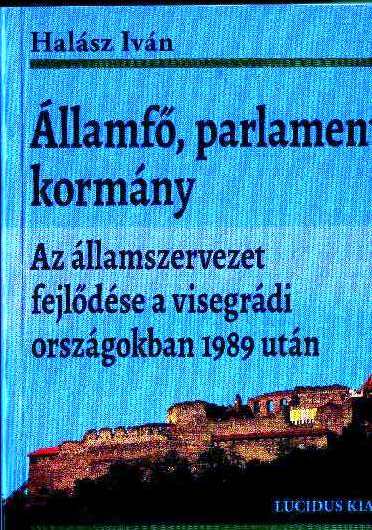Államfő, parlament, kormány.
Head of State, Parliament, Government.
The Development of State Structure in the Visegrad Countries after 1989.
Author(s): Iván Halász
Subject(s): Politics / Political Sciences, History, Governance, Political history, Recent History (1900 till today), Transformation Period (1990 - 2010)
ISSN: 1585-3144
Published by: Lucidus Kiadó
Keywords: State structure;
Government policy;
Distribution of state power branches;
Parliamentarianism;
Visegrad countries;
Turn of the millenium;
Summary/Abstract: This monograph studies the post-1989 constitutional development of the four Visegrad countries (the Czech Republic, Poland, Hungary and Slovakia). More precisely, it focuses on one aspect of state structure, which is perhaps the most important one concerning the modern Western-type distribution of power: the system of relations between the head of state, the Parliament and the government. Thus, questions such as the relationship of the central government and the local governments, the architecture and competence of judicial authorities that are to watch over constitutionality, or the various controlling organs and legal service providers are outside the scope of this book. On the other hand, the publication aims at presenting the historical development of the individual Central European state power organs, at least in terms of their constitutional and democratic development in the 20th century. This is especially true for the position of the head of state and the Parliaments. The problematics of governance, a complex topic in itself, is examined within the system of relations of the legislature and the head of state.While offering a broad overview of the 20th-century antecedents, the book – in harmony with its title – places the main emphasis on the presentation of the period from 1989 to 2013. The monograph discusses the developments until as recently as 2013, for not only Hungary has seen important changes in the domain of state structure over the past three to four years, but the other countries of the region as well. The book devotes a special attention to those debates and dilemmas that were characteristic of the individual countries during the transition, on the one hand, and at the time of major turning points or internal political crises, on the other. That involves especially the dilemma of having a unicameral or a bicameral Parliament, the direct or indirect election of the head of state, the issue of constructive or destructive motion of no confidence and in connection to that, the responsibility of the head of the government and the ministers.
- Print-ISBN-13: 978-963-946-587-9
- Page Count: 370
- Publication Year: 2014
- Language: Hungarian
- eBook-PDF
- Table of Content
- Sample-PDF
- Introduction

